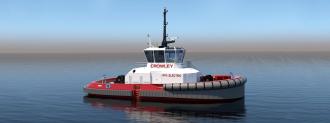9
Tugboats have to help vessels far larger than themselves. To get their tremendous pushing power, the tiny, cute boats and their oversized engines create a lot of force and guzzle a lot of fuel — anywhere from 100-200 gallons per hour, or up to 5,000 gallons per day.
But that could soon be changing.
The port of San Diego will soon launch the first electric tugboat in the U.S., leading the way toward a greener industry.
What are the specs? Crowley Maritime Corp. has announced its plans to build an all-electric tugboat for the San Diego port. The boat, called eWolf, is scheduled to launch in 2023 and will use 6MWH of battery power instead of burning any fuel. It will be the first zero-emission tugboat in the United States.
“Crowley’s first-of-its-kind electric tugboat is a game changer. It checks all the boxes by providing environmental, economic, and operational benefits for our communities and maritime industry,” Chairman Michael Zucchet of the Port of San Diego Board of Port Commissioners said in a statement.
Crowley joined forces with Master Boat Builders in Coden, Alabama, and Jensen Maritime to build the new electric tugboat. It will have over 70 tons of bollard pull, which is the pulling power of a tug. By comparison, the average medium-sized port tugboat can generate 50 to 60 tons of bollard pull.
“Crowley’s first-of-its-kind electric tugboat is a game changer. It checks all the boxes by providing environmental, economic, and operational benefits for our communities and maritime industry.”
Michael Zucchet
To keep the eWolf’s battery system topped up, Crowley will construct a shoreside charging station. And, anticipating more innovations in the shipping industry, Crowley will outfit the electric tugboat with artificial intelligence technology to improve safety and performance.
What this means: The maritime industry isn’t known for focusing on green innovations, but a few initiatives could make a big impact. Last year, Washington Ferries announced their switch toward hybrid-electric ferries. Crowley could set a precedent with this new electric tugboat.
“The eWolf represents everything Crowley stands for: innovation, sustainability and performance. With this groundbreaking tug design, our team continues to embrace our role as leaders in the maritime industry while providing our customers with innovative and sustainable solutions done right,” said CEO Tom Crowley.
We’d love to hear from you! If you have a comment about this article or if you have a tip for a future Freethink story, please email us at [email protected].






